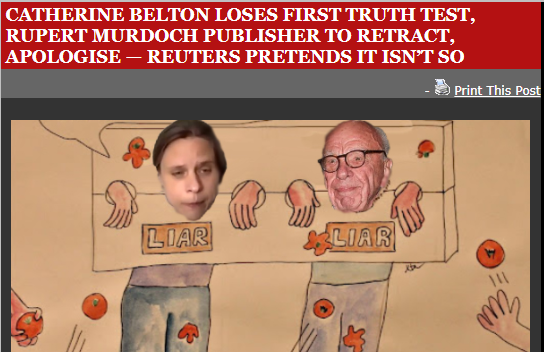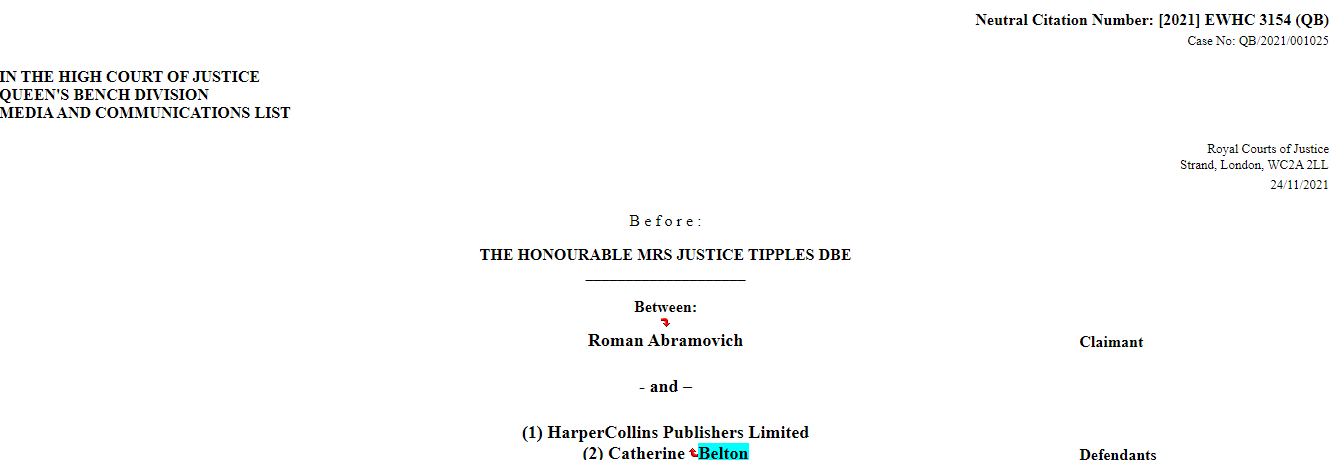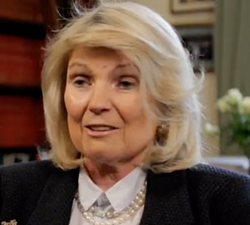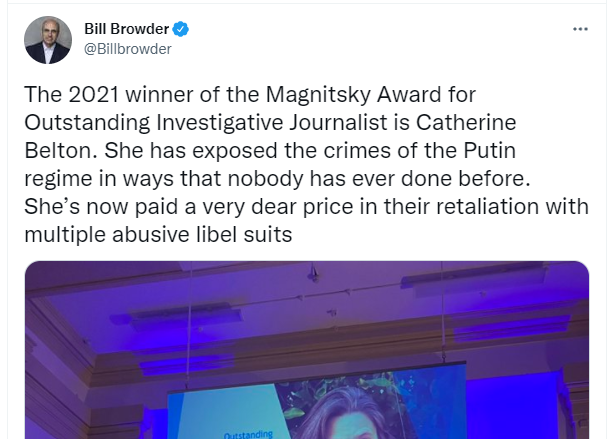

By John Helmer, Moscow
@bears_with
A High Court judge in London has ruled sharply against Catherine Belton and Rupert Murdoch’s book publisher HarperCollins dismissing their principal lines of defence against a multi-million pound case for libel by Roman Abramovich and the Russian state oil company Rosneft.
Yesterday, in two detailed examinations of Belton’s allegations of a corrupt conspiracy masterminded by President Vladimir Putin and implemented by Abramovich, Rosneft and others, Justice Amanda Tipples (lead image) dismissed the publisher’s case that Belton had been justified in reporting opinions from named or anonymous sources. The judge’s rulings cast doubt on the credibility of Belton’s sources, requiring lawyers for the defence to show in trial next year that Belton’s reporting proves the truth of her “statements of fact”. This sets the stage for one of the largest and most expensive court tests of truth and faking in the Anglo-American war against Russia.
Worse for Belton and HarperCollins, Tipples ruled that their allegation that Rosneft had created a fake transaction to bribe Putin with $300 million is a statement of fact which Belton is unlikely to be able to prove in the witness box on oath and under cross-examination. Tipples dismissed Belton’s method of using sources whose “denials do not provide any antidote to the information provided by Mr Kondaurov or the anonymous source.”
“This is a big blow to the anti-Russian propaganda that’s the basis for the US and European sanctions war”, a New York attorney with multinational clients comments. “It will have a bigger impact than the recent Justice Department Russiagate indictments exposing sources connected to the secret services whose lies to the media and FBI are going to land them in jail.”
The judgement on the Abramovich libels runs for 20 pages, with a 9-page annex of excerpts from the book; read it in full here.
The judgement on the Rosneft libels is 15 pages in length, with another four of excerpts. Read it here .

Left to right: Roman Abramovich; Vladimir Putin; Igor Sechin.
Belton’s book, “Putin’s People, How the KGB Took Back Russia and then Took on the West”, was published in the UK and US last year. The US paperback edition has been stopped by publisher’s fears of liability in the court case. Read the archive of the court case and Belton’s career record here.
Lawyers for HarperCollins have already settled out of court a parallel London lawsuit by Alfa Bank shareholders Mikhail Fridman and Pyotr Aven. The publishing company admitted there was “no significant evidence” for Belton’s allegations of KGB connections in Fridman’s and Aven’s early careers; and that she had failed to check her claims with them before publication. In the publisher’s statement read out in court on July 28, “HarperCollins and [Belton] recognise and regret that comment was not sought earlier from Mr Aven and Mr Fridman… and to apologise that the subject was not discussed with them prior to initial publication.”

Left, Catherine Belton; right, Rupert Murdoch. Source: http://johnhelmer.org/
Fridman and Aven have also won court judgements against the Russiagate fabricator Christopher Steele for what High Court Justice Sir Mark Warby has condemned as ““hearsay, some of it opinion, and much of it based on unverifiable information from unidentified sources.” Steele has been uncovered as one of Belton’s friends and sources for her book; an FBI investigation of Steele, Belton, and their media associates is continuing in Washington.
At preliminary hearings in London late in July, lawyers for Belton and HarperCollins argued the book’s allegations – even if they prove to be untrue – were not defamatory of either Abramovich or Rosneft. They also claimed that under British libel law, the book’s allegations were properly sourced expressions of opinion, not expressions of fact. The difference in a High Court trial between statements of fact and expressions of opinion is the truth test. If Tipples had ruled this week that the meanings an “ordinary reasonable reader” would draw from the book were opinions, not facts, then Belton would not be obliged to prove her allegations under oath. Tipples rejected this cornerstone of Belton’s defence.
“There is no dispute that a meaning will be defamatory of the claimant [Abramovich, Rosneft] at common law,” Tipples declared, “if it tends to have a substantially adverse effect on the way that right-thinking members of society generally would treat him or her.”

Open and read the Tipples rulings on the Abramovich libels, https://www.bailii.org/.
The nine libels Abramovich has accused Belton of printing include the purchase of the Chelsea Football Club, the sale of the Sibneft oil company, bribes to the family of High Court Justice Dame Elizabeth Gloster, bribes to the Yeltsin family and to Putin. Tipples concluded these are all statements of fact which must now be verified to the court standard.
“The defendants [Belton, HarperCollins] maintain that the reasons why the claimant [Abramovich] has made the fortune from his business empire available for the use of President Putin and his regime, purchased Chelsea Football Club, invested in Rosneft and moved to New York are statements of opinion. I disagree. These reasons are verifiable as facts, and that is how the words would strike the ordinary reasonable reader. The statements complained of are all statements of fact.”
In passing comments, the judge added explicit criticism of Belton’s journalism and her professional method. “There is no chronology or timeline of important events,” Tipples said. “That was something I noticed when I read the Book, as sometimes the order in which things happened was not entirely clear to me.” “On some topics she does not have a complete picture…… [on other topics] the reader is given conflicting information.”
Tipples has also warned that in trial – which is expected to follow next year after the lawyers conduct intensive examination of witnesses and Belton herself – the judge is sceptical of the “sufficiency” of the evidence presented in the book. On Belton’s report of a corrupt scheme for Abramovich to buy Chelsea on Putin’s instruction, Tipples ruled that “would not be understood by the ordinary reasonable reader as providing sufficient reason to doubt that the claimant purchased Chelsea Football Club on President Putin’s orders.”
The judge also dismissed Belton’s method of burying contradicting evidence: “In so far as there is antidote in footnote 41, it is completely undermined by this statement, and that is not salvaged by the use of the word ‘may’ eleven pages later (p. 364).”

Although the hearings to date test meaning to a reader, not truth in evidence, Tipples has now rejected Belton’s report that Abramovich had bribed the stepson of Justice Gloster (right) when she was presiding in Boris Berezovsky’s court case against Abramovich in 2011. “On any sensible reading of the text,[the allegation] cannot be right,” Tipples decided this week. For the record of that case, click to read.
Belton’s allegation that Abramovich had bribed Yeltsin family members “through the oil trades between Sibneft and Belka Trading is, in my view,” Tipples announced, “fanciful.”
In concluding her ruling on the Abramovich allegations, Tipples appears to hint that she herself regards Putin’s administration to be a “totalitarian regime”. However, it is precisely because that is the context of the book that the judge has now ruled Belton’s allegations against Abramovich must be interpreted as defamatory statements of fact, which the journalist, the publisher and their lawyers must now prove to be true in trial.
“The Book, however, tells the story of how the totalitarian regime in Russia today has come about and it is therefore not possible to leave it out of account. Mr Caldecott [advocate for HarperCollins] recognised this in his oral submissions and accepted that meanings 1 to 3 were all defamatory of the claimant [Abramovich] at common law. However, he maintained that the nature of the regime has a very material effect on the sting and gravity of the allegations as a reasonable person would not support a totalitarian regime. The defendants accept that meanings 4 and 5 are defamatory of the claimant at common law. In conclusion, therefore, the meanings I have identified are all defamatory of the claimant at common law.”
In her accompanying judgement on Belton’s libels against Rosneft, chief executive Sechin, and Putin, Tipples ruled that the allegation the company had contrived the fraudulent sale of the Severnaya Neft oil company to camouflage a $300 million bribe to Putin was libelous, and must now be proved in court. Tipples rejected the defence lawyers’ argument that Belton had provided sufficient sources to allow a reader to choose between conflicting evidence — antidote is the libel law term. “I agree with Mr Browne [Rosneft advocate] that these denials do not provide any antidote to the information provided by Mr Kondaurov [employee of Mikhail Khodorkovsky] or the anonymous source.”

Source: https://www.bailii.org/
“There is strong reason to suspect that Rosneft, then a state-owned Russian oil giant, paid $600 million to purchase Severnaya Neft, being twice the accepted valuation, so that the overpayment of $300 million would be paid to President Putin or his associates in the KGB for their own use. This allegation relates to events 18 years ago. However, it was a payment of $300 million, a very substantial amount of money, which there are strong grounds for suspecting ended up in the hands of President Putin or his ‘KGB men’. The claimant [Rosneft] was then state-owned, but it is the same corporate entity today as it was then. This imputation is, in my view, actionable as it has a tendency to cause a substantial adverse effect on people’s attitudes to the company… Accordingly the meaning I have identified is defamatory of the claimant [Rosneft] at common law. The statements complained of are statements of fact.”
On three of the libellous allegations in the book – the Yukos takeover, Rosneft’s share sale, and a bribery scheme for the Italian political party, Liga Nord — Tipples ruled that Belton’s claims are “statements of fact” for whose truth or falsity she will be tested in the coming months. However, the judge ruled they are not defamatory of the oil company because it was not directly tied to the plotting. Belton’s criticism “is directed at the Kremlin or the KGB, and not at the claimant.”
In its reaction, HarperCollins has not published its comment on the company website. Instead, it issued a statement to journalists in the anti-Russian camp. “We are pleased,” the company told the Guardian, “that the judge has found three of the four passages complained of by the Russian state-owned oil giant Rosneft do not bear a meaning defamatory of the company and therefore will not proceed, and that several serious meanings in Mr Abramovich’s claim have also been rejected.” “The judge found, in relation to the majority of Mr Abramovich’s complaints, that he had exaggerated the meaning of the words he complained about and rejected one complaint in its entirety.”
Abramovich’s spokesman responded: “Today’s judgment further underscores the need for the false and defamatory claims about Mr Abramovich to be corrected as soon as possible.”
Belton’s ally in the propaganda war and the source for some of her allegations, Bill Browder, has attacked the High Court truth test as “abusive”, and awarded Belton a prize.

Source: https://twitter.com
Reuters, the US-directed employer of Belton at the moment, reports she “declined to comment”. The Financial Times, which employed Belton between 2007 and 2017 to publish much of the material now on trial in the book, has yet to report on the latest court judgements.











Leave a Reply